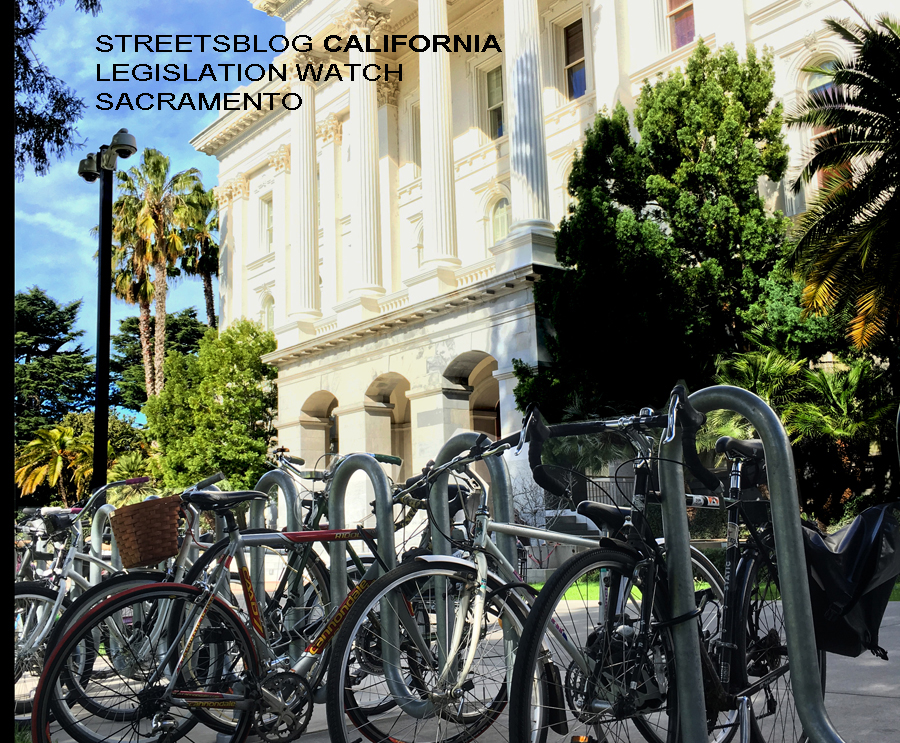Note: GJEL Accident Attorneys regularly sponsors coverage on Streetsblog San Francisco and Streetsblog California. Unless noted in the story, GJEL Accident Attorneys is not consulted for the content or editorial direction of the sponsored content.
The 2023 legislative session is very young, but already some of unfinished sustainable transportation business from last year is cropping up. Streetsblog welcomes more conversation on these topics, including aligning transportation funding with climate goals, stopping investments in car-dominant transportation, and allowing bike riders to behave rationally at stop signs.
Prioritize Climate in Transportation Funding
Assembly Transportation Chair Laura Friedman, who championed several important changes to state law around bicycles, speed limits, and parking requirements last year, introduced two of these bills. The current language of the first, A.B. 6, is about requiring regional planning agencies to prioritize transportation funding for projects that help meet their sustainable community strategies and support state climate goals. Friedman got a similar bill all the way through the legislature last year, but it was vetoed by Governor Newsom, who deemed it unnecessary - an arguable take at best. Asm. Friedman is clearly not going to give up. This bill has slightly different wording from last year's A.B. 2438, indicating she might be taking a slightly different approach by focusing on local and regional rather than state funds.
The press release for A.B. 6 from Friedman's office positions it as a way to support the goals of S.B. 375, which required regions to integrate transportation, land use, housing, and air quality planning. S.B. 375 has famously resulted in profound changes in the way regions plan, but not so much in actual on-the-ground changes, in large part because funding streams are at odds with its goals. This bill, and its predecessors, and many other parallel efforts, are casting about for ways to fix that.
No New Freeways
Friedman has also introduced A.B. 7, which would prohibit the state from investing in freeway projects that only benefit single occupancy vehicles. The wording right now says that the bill intends to: "eliminate single occupancy vehicle freeway capacity projects, and allow capacity projects only for bus rapid transit, rail, active transportation purposes, projects that significantly add safety, and projects that significantly reduce congestion, without interfering with existing maintenance and rehabilitation needs."
This is not the first time around for the idea of stopping freeways via legislation. Last year's bill on the topic, A.B. 1778, was authored by Asm. Cristina Garcia, whose focus was on prohibiting new freeways through disadvantaged communities. That bill was killed in the Senate Transportation Committee when the head of that committee, Asm. Lena Gonzalez, remained opposed and was out sick on the deadline to pass bills.
Stop Signs as Yields for Bike Riders
And Assemblymember Tasha Boerner Horvath has introduced A.B. 73, which says it will aim to create "a stop-as-yield pilot program seeking to improve the flow of traffic by allowing both drivers and bicyclists to move safely at an intersection where there is a stop sign."
Last year Asm. Boerner Horvath pulled her bill, A.B. 1713 - even though it passed most of its legislative committee votes - when Governor Newsom made it clear he planned to veto it. It was already at least the third attempt to rationalize stop sign laws as several other states have already done. Each time these bills have gotten wide support, and it's good news that she's back ready to try again.
Note that the wording of all these bills can - and will - change in the grinder that is the legislative process. Advocates and constituents can and should weigh in with the authors to help strengthen or clarify the language (and there may already be a few phrases here that need work; for example is it the author's intention to let drivers treat stop signs as yields?).
Because these issues have shown to be controversial in past sessions, take note that they could use public support.
Of course Streetsblog will be tracking them.






